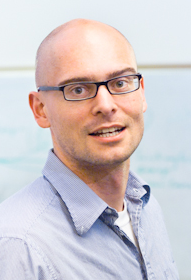
RI Seminar
October

3:30 pm to 4:30 pm
Event Location: NSH 1305
Bio: Pieter Abbeel received a BS/MS in Electrical Engineering from KU Leuven (Belgium) and received his Ph.D. degree in Computer Science from Stanford University in 2008. He joined the faculty at UC Berkeley in Fall 2008, with an appointment in the Department of Electrical Engineering and Computer Sciences. He has won various awards, including best paper awards at ICML and ICRA, the Sloan Fellowship, the Air Force Office of Scientific Research Young Investigator Program (AFOSR-YIP) award, the Office of Naval Research Young Investigator Program (ONR-YIP) award, the DARPA Young Faculty Award (DARPA-YFA), the Okawa Foundation award, the TR35, the IEEE Robotics and Automation Society (RAS) Early Career Award, and the Dick Volz Best U.S. Ph.D. Thesis in Robotics and Automation Award. He has developed apprenticeship learning algorithms which have enabled advanced helicopter aerobatics, including maneuvers such as tic-tocs, chaos and auto-rotation, which only exceptional human pilots can perform. His group has also enabled the first end-to-end completion of reliably picking up a crumpled laundry article and folding it. His work has been featured in many popular press outlets, including BBC, New York Times, MIT Technology Review, Discovery Channel, SmartPlanet and Wired. His current research focuses on robotics and machine learning with a particular emphasis on challenges in personal robotics, surgical robotics and connectomics.
Abstract: Robots are typically far less capable in autonomous mode than in tele-operated mode. I believe advances in machine learning and optimization have the potential to significantly narrow the gap between what’s possible in tele-operation and what’s possible autonomously. First, I will describe in depth “Apprenticeship learning,” a new approach to equip robots with new skills through learning from ensembles of expert human demonstrations. Our initial work in apprenticeship learning enabled the most advanced helicopter aerobatics to-date, including maneuvers such as chaos, tic-tocs, and auto-rotation landings which only exceptional expert human pilots can fly. Our most recent work in apprenticeship learning is inspired by challenges in surgical robotics. We are studying how a robot could learn to perform challenging robotic manipulation tasks, such as knot-tying. Next, I will describe our recent advances in optimization based planning — both in state space and in belief space. Finally, I will briefly discuss our recent work on enabling robots to learn on their own through non-parametric model-based reinforcement learning.